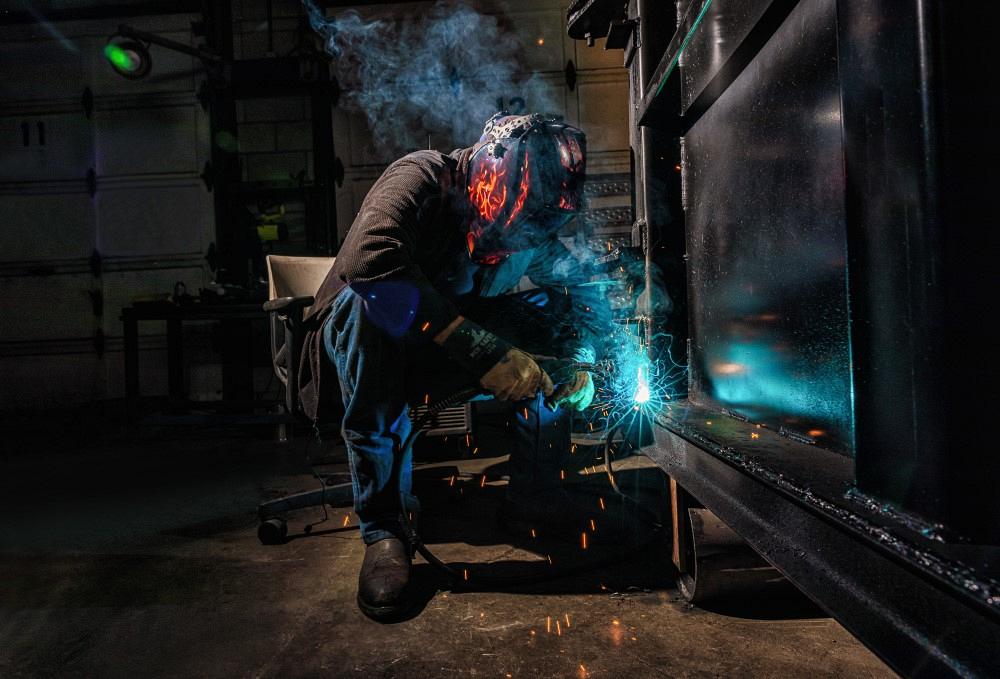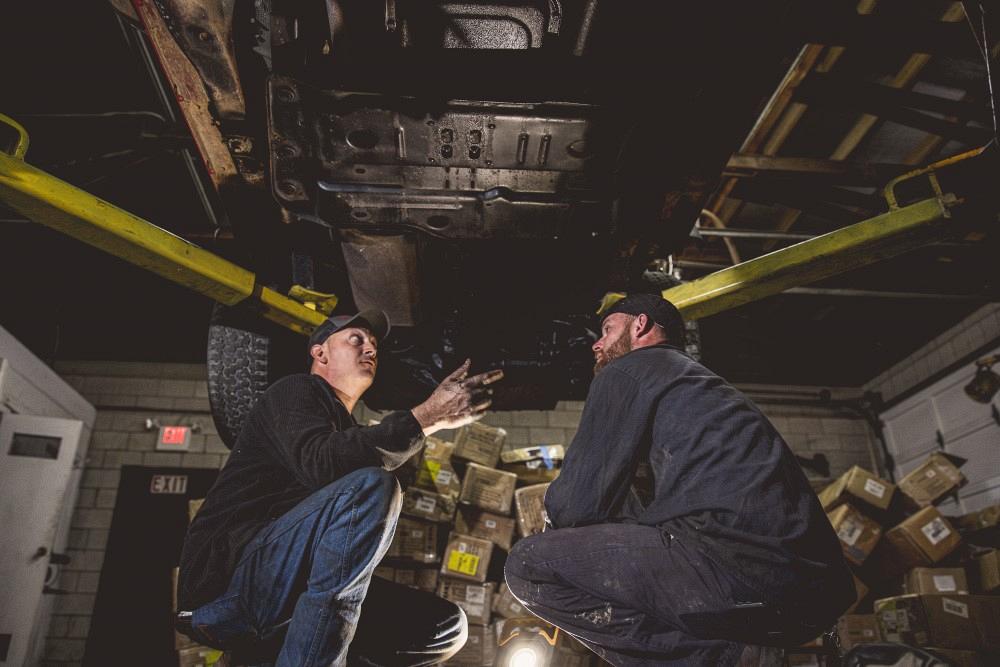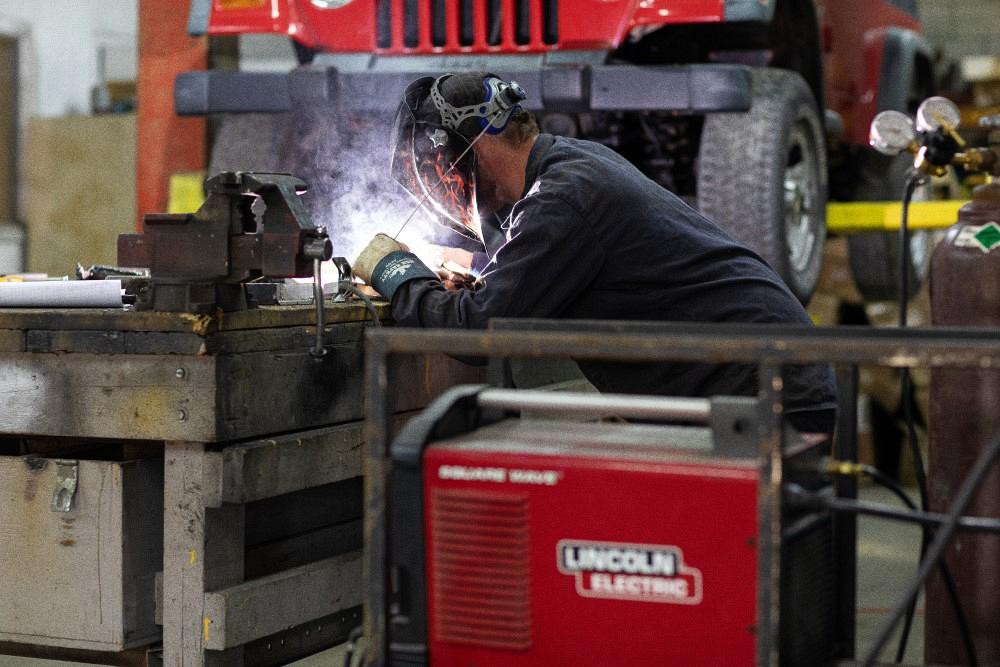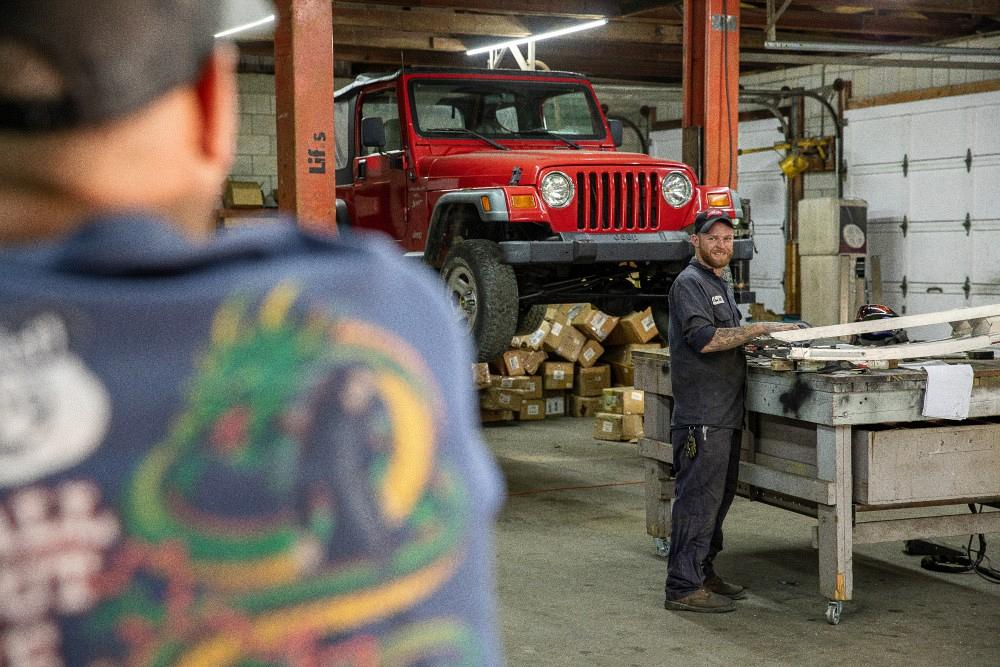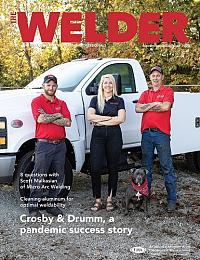- FMA
- The Fabricator
- FABTECH
- Canadian Metalworking
Categories
- Additive Manufacturing
- Aluminum Welding
- Arc Welding
- Assembly and Joining
- Automation and Robotics
- Bending and Forming
- Consumables
- Cutting and Weld Prep
- Electric Vehicles
- En Español
- Finishing
- Hydroforming
- Laser Cutting
- Laser Welding
- Machining
- Manufacturing Software
- Materials Handling
- Metals/Materials
- Oxyfuel Cutting
- Plasma Cutting
- Power Tools
- Punching and Other Holemaking
- Roll Forming
- Safety
- Sawing
- Shearing
- Shop Management
- Testing and Measuring
- Tube and Pipe Fabrication
- Tube and Pipe Production
- Waterjet Cutting
Industry Directory
Webcasts
Podcasts
FAB 40
Advertise
Subscribe
Account Login
Search
Starting a small welding and fabrication business during COVID-19
4 important lessons learned during one Indiana job shop's fight to make it in the pandemic
- By Amanda Carlson
- December 2, 2020
- Article
- Arc Welding
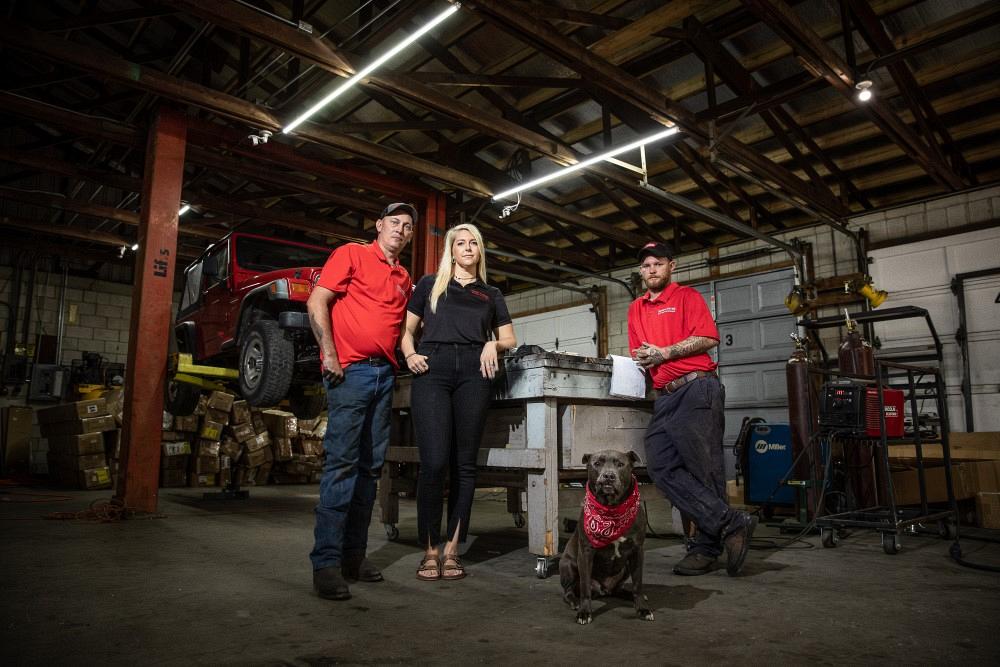
Crosby & Drumm owners, (L to R) Daniel Crosby, Jessica Crosby, and Joe Carter (and their dog Auto) have learned some difficult lessons since March, but they believe they have come out stronger as a result. Photos courtesy of Brescher Filming & Photography LLC
There’s never a perfect time to start a business. Developing a concept that fills a need is tough enough. Add in the startup costs associated with securing a building, acquiring necessary equipment, setting up infrastructure, and hiring staff. With all that in place, there still needs to be enough work coming in to keep the lights on and the doors open.
Small businesses are risky in even the best of times.
Now try starting a business with all those existing obstacles and add in a global pandemic. Sounds like a recipe for failure, right?
You certainly don’t have to tell that to Jessica and Daniel Crosby, who last March started Crosby & Drumm in Jasper, Ind., 14 days before COVID-19 arrived and changed everything. What should have been a time of excitement and optimism paired with a healthy dose of stress quickly turned to straight-up chaos and uncertainty.
Though they thought they had done all the right things and had carefully planned and prepared for most if not all of the usual new business pitfalls, they certainly hadn’t prepared for COVID-19 or what would happen as a result.
What took place in the weeks and months since has been nothing short of a roller coaster ride to hell and back. But the Crosbys and friend/co-worker Joe Carter have fought tooth and nail to keep the company from going under well before it ever got a fair chance to get started.
The Calm Before COVID-19
Jessica Crosby, company co-owner and wife of Daniel Crosby, always saw herself as a business owner. A dental hygienist by trade, Jessica never lost the aspirations she had to be in business for herself.
Daniel, a trained underwater welder who moved to the automotive sector, has worked at multiple companies doing custom welding and repair on commercial trucks as well as upfitting them with service and platform bodies, heavy-duty frame modifications, all-wheel drive kits, and other custom components.
Daniel recalled always daydreaming during his lunch hour about going into business for himself. The more he and Jessica talked about it, the less of a pie-in-the-sky idea it became.
Starting a business always carries some risk, but even so, Jessica was fully onboard and supported Daniel. They wanted to build a small business with a heavy focus on what Daniel describes as commercial and personal vehicle upfitting, which included installing tarp systems, lift gates, and custom and stock ladder racks. They also planned to do custom Jeep upfitting, including installing lift kits, wheel, tires, and other accessories. In addition, they also wanted to dabble in custom fabrications and mobile welding to serve the needs of the automotive and agricultural industries.
They started planning back in October 2019, submitted paperwork for the LLC in December, and then signed a lease for the building in January 2020. The plan was for Daniel to handle the upfitting and custom fabricating and welding while Jessica dealt with the paperwork, accounting, and financial planning in her spare time.
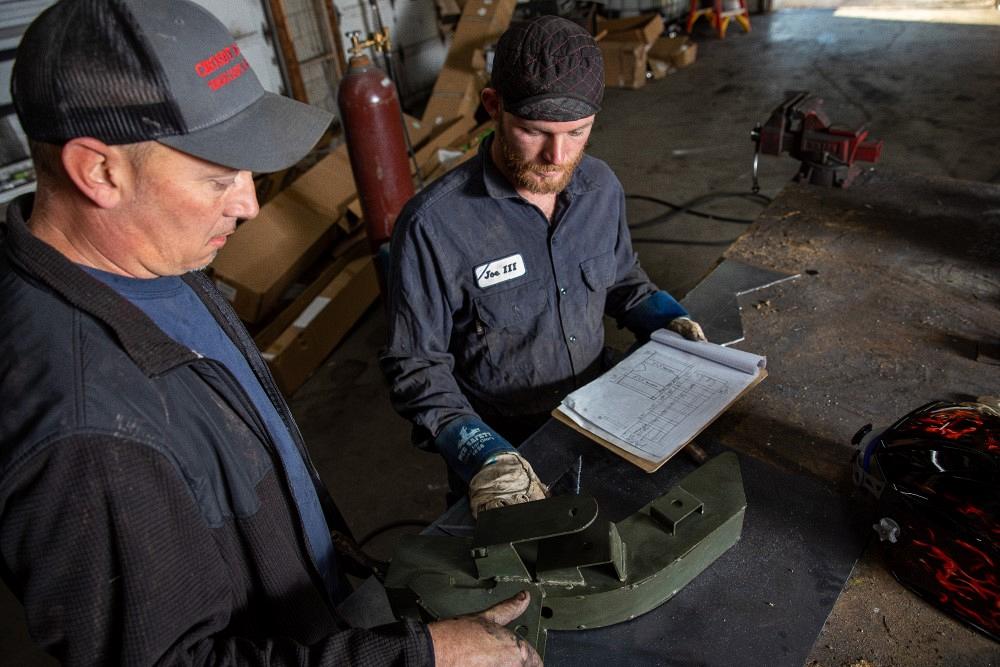
The business was initially intended to focus heavily on commercial and personal vehicle upfitting and custom Jeep upfitting, with a little custom fabricating and mobile welding on the side. That plan flew out the window as soon as the pandemic hit. The Crosbys and Carter adjusted turned their focus away from upfitting and onto whatever work came their way.
The Crosbys weren’t naive. They knew that difficulties and unexpected hiccups were bound to crop up once their doors were open, but they were prepared at least from a financial standpoint.
“We had our finances in order and were prepared to start this business knowing that Daniel probably wouldn’t bring in a paycheck for a while as we got up and running,” Jessica said.
On March 1, 2020, Crosby & Drumm opened for business. Of course it was an exciting, nerve-wracking, and gratifying time. Little did they know things would change just 14 days later.
Of all the things new business owners plan and prepare for, a global pandemic usually isn’t real high on that list, at least that’s been the case over the last century. But that’s exactly what Daniel and Jessica were dealing with.
The arrival of COVID-19 meant the closure of nonessential businesses, like the dental office where Jessica worked, putting a huge dent in their plan of relying on that as their one steady source of income.
“I was terrified,” Jessica stated. “I’ve been working since I was 14 and I’ve never been out of a job before. Our plan was for me to be the sole provider not only for our household, but for the business as well, at least temporarily. To say that having both Daniel and I out of work at the same time was scary would be an understatement.”
It also just about halted any major sources of income the business had hoped to secure. For how long? They didn’t know.
Needless to say, none of their initial plans from back in the fall were panning out, but that’s understandable given that they started a business during the most unprecedented and turbulent year of our lifetime.
But you won’t hear Jessica, Daniel, or Carter complain about any of that. Their doors are still open, the upfitting businesses is on the rebound, and in July they celebrated with a ribbon-cutting ceremony with the Jasper Chamber, a day that they weren’t sure they’d ever experience back in March.
While they know they have a long road ahead, they have taken every opportunity to learn all the tough lessons that this year has doled out—and there were plenty.
Lesson 1: Be on Time, Even During a Pandemic
One of the biggest points of confusion during the first weeks of the pandemic was what made a business essential. For some businesses it was very clear, but for Crosby & Drumm, an aspiring vehicle upfitter with custom fabrication and mobile welding capabilities, it was about as clear as mud.
On day No. 1 of the stay-at-home order, they decided to sleep in and get to the office around 9 a.m.
In hindsight this wasn’t a great decision.
“Our normal hours are 8 a.m. to 5 p.m. When we showed up at 9 there was somebody there waiting for us. He was there to upfit his Jeep, but we didn’t know ahead of time that he’d be there. And he got on us for being late. He told us showing up late is no way to start a business and that we’ve got to make sacrifices if we want to make it. We were a little surprised because we thought we were all supposed to stay at home. We tried to explain that to him, but he said he didn’t care and he made sure to let us know he was disappointed in us.
“So Daniel, not knowing if we were considered an essential, started looking up the definition and decided that, yeah, we were essential and moving forward we would carry our regular hours. That was a huge lesson right off the bat,” Jessica explained.
Lesson 2: Ask for Help
While the upfitting work had pretty much dried up, a few custom fab jobs trickled in, though it wasn’t enough to pay the bills at the business or at home. To help make ends meet, Daniel took a part-time job driving a truck for Nutrien Ag Solutions while Jessica spent the time off from her full-time job to get the office side of the business set up and on solid footing. When Daniel wasn’t driving, he was in the shop working on the fab jobs that came through.
“We’d put a sign on the front door of the shop saying we were out of the office on a service call when we weren’t at the shop,” Daniel said.
COVID-19 had put their business partner in a difficult position to choose a fledgling business with no paycheck for the foreseeable future over a steady income. Being the sole provider of his household, he chose a steady income and bowed out of the business. Around the same time, three large jobs rolled into the shop. It was a critical moment for the new business that they needed to get right if they had any chance of making it.
“I told Daniel we needed to get these jobs in and out quickly, period. We needed the word-of- mouth to be positive, and it wouldn’t be if it was taking us forever to turn these jobs around. But it was an overwhelming amount of work for just him,” Jessica said.
Help arrived in the form of Daniel’s friend Carter, who he met a little more than a decade earlier when they were co-workers at a heavy-duty equipment manufacturer. Carter was working as a mason and laborer, a job he didn’t totally love, when he got a phone call from Daniel asking for help with a few welding jobs. He jumped at the opportunity.
They worked well together and each does different things well – Daniel’s strength is gas metal arc welding while Carter’s is shielded metal arc welding and gas tungsten arc welding.
So when Daniel and Jessica asked Carter if he’d be interested in sticking around for good, there was no hesitation, even with the knowledge that it might be a while before he got a paycheck.
Lesson 3: Just Say Yes
Custom fabricating and mobile welding were supposed to make up only a small slice of the pie, but COVID-19 changed all of that.
“Welding and fabrication have been our bread and butter. We thought it was going to be more of a side hustle because the money really is in the commercial upfitting. We haven’t abandoned upfitting, but we are leaning in hard to the welding and fabrication because the work is there,” Jessica said.
Added Daniel, “Around here in March the farmers were out planting in full force, which also means they’re tearing up their equipment and needed someone to fix it. So we jumped right in and started doing on-site welding and repair.”
Their motto quickly became “Just say yes.” Get the job in the door, do quality work in a timely fashion, and create positive word-of-mouth within the community. They literally said yes to welding anything, from a garden hoe to a semitrailer and outdoor furniture. They’ve even tackled several aluminum boat jobs.
Recently Daniel said that while they’ve seen signs that automotive manufacturers are picking up steam and hope that the upfitting will eventually come, they aren’t abandoning the type of work that has kept them in business these last seven months.
“We’re not going to forget where we came from, so to speak. We’re going to continue doing custom work because we are filling a need,” Daniel said.
Lesson 4: Embrace the Struggle
Quitting would have been the easy out, and while that thought crossed their minds from time to time, it was never a serious option. Jessica’s dental office reopened, allowing her to go back to work and bring in income. They stayed true to putting whatever they made from the business back into the business.
Most of the equipment they have is used apart from a brand-new Lincoln Electric TIG machine they bought to handle the aluminum welding work. They bought a used Miller Electric diesel engine-driven welder and mounted it to the back of a truck for mobile jobs, they have a 1972 forklift with a 12,000-lb. lift capacity, and they have a Miller Electric Millermatic 252 MIG machine. They’d like to get a plasma cutter next.
The company isn’t suffocating under massive debt, and they don’t have any silent financial backing. They’ve managed to stay afloat all by themselves. But, of course, they had doubters.
“We had a lot of haters when we started out. We had a lot of people tell us that we were going to fail. They said we had no clue what we were doing and suspected that we were getting financial help from someone else. There were all kinds of rumors going around, but none of them were true. We’ve done this 100% on our own without really any guidance. Other than asking other business owners for a quick word of advice, we’ve completely done this ourselves,” Jessica said.
The upside to the struggles, Daniel said, is the three of them have developed a strong bond that has made working together enjoyable. Their back-and-forth banter resembles a family gathering more so than a business.
That’s not to say there aren’t disagreements. There are. But Jessica said that their shared experience these last few months has given them the perspective to put those aside in favor of the work and their long-term goals.
This has been a turbulent year, but even through the struggles and tough lessons, Jessica, Daniel, and Carter haven’t forgotten why they got into the business in the first place.
“My ultimate dream is to eventually bring high school kids in here and teach them how to weld, work with machines, and get interested in custom and skilled work. And maybe one day a few of those kids will come back and want to work with us,” Daniel said.
About the Author

Amanda Carlson
2135 Point Blvd
Elgin, IL 60123
815-227-8260
Amanda Carlson was named as the editor for The WELDER in January 2017. She is responsible for coordinating and writing or editing all of the magazine’s editorial content. Before joining The WELDER, Amanda was a news editor for two years, coordinating and editing all product and industry news items for several publications and thefabricator.com.
About the Publication
subscribe now
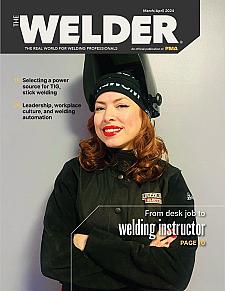
The Welder, formerly known as Practical Welding Today, is a showcase of the real people who make the products we use and work with every day. This magazine has served the welding community in North America well for more than 20 years.
start your free subscription- Stay connected from anywhere

Easily access valuable industry resources now with full access to the digital edition of The Fabricator.

Easily access valuable industry resources now with full access to the digital edition of The Welder.

Easily access valuable industry resources now with full access to the digital edition of The Tube and Pipe Journal.
- Podcasting
- Podcast:
- The Fabricator Podcast
- Published:
- 04/16/2024
- Running Time:
- 63:29
In this episode of The Fabricator Podcast, Caleb Chamberlain, co-founder and CEO of OSH Cut, discusses his company’s...
- Trending Articles
Sheffield Forgemasters makes global leap in welding technology
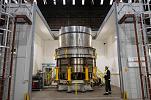
Welding student from Utah to represent the U.S. at WorldSkills 2024

Lincoln Electric announces executive appointments

Lincoln Electric acquires RedViking
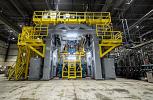
Engine-driven welding machines include integrated air compressors

- Industry Events
16th Annual Safety Conference
- April 30 - May 1, 2024
- Elgin,
Pipe and Tube Conference
- May 21 - 22, 2024
- Omaha, NE
World-Class Roll Forming Workshop
- June 5 - 6, 2024
- Louisville, KY
Advanced Laser Application Workshop
- June 25 - 27, 2024
- Novi, MI
























